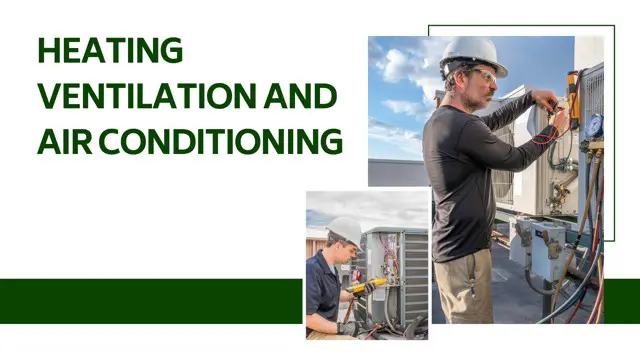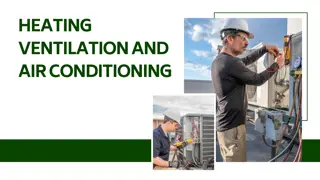
Heating, ventilation, and air conditioning Course
CPD Certified| Free PDF Certificate | Lifetime Access | Learner Support | No Hidden Fees | 100% Success Rate
EDURISE
Summary
- Certificate of completion - Free
- Reed courses certificate of completion - Free
- Tutor is available to students
Add to basket or enquire
Overview
In-Demand HVAC Expertise
In today's world, the need for skilled professionals in Heating, Ventilation, and Air Conditioning (HVAC) is soaring. With climate control becoming increasingly crucial in homes, offices, and industries, HVAC experts are in high demand.
The Business of Climate Comfort
Efficient HVAC systems are the lifeline of comfort in both residential and commercial spaces. Businesses depend on climate control to maintain productivity, while homeowners seek comfort in their everyday lives. The HVAC industry plays a vital role in ensuring both.
Career in Climate Control
A career in HVAC offers various advantages:
Growing Industry: The HVAC industry is projected to grow steadily as climate control becomes more vital in various sectors.
Diverse Roles: HVAC experts can specialize in installation, maintenance, or repair, or even start their businesses offering HVAC solutions.
Steady Demand: Climate control is a year-round necessity, ensuring job stability for HVAC professionals.
Technological Advancements: Constant innovation in HVAC technology means ongoing learning and skill enhancement.
Profitable Business Ventures: Knowledge of HVAC can lead to entrepreneurial opportunities in offering HVAC services.
Mastering HVAC Systems
Our HVAC course equips you with knowledge and skills to excel:
Heating Systems: Learn about different heating systems, including furnaces, heat pumps, and boilers, and their operation and maintenance.
Ventilation Systems: Understand ventilation principles and systems that ensure proper air circulation and indoor air quality.
Air Conditioning Systems: Master the intricacies of air conditioning, including refrigeration cycles and system installation and maintenance.
Energy Efficiency: Discover strategies to maximize energy efficiency and reduce environmental impact in HVAC systems.
Troubleshooting and Repairs: Develop expertise in diagnosing and repairing HVAC system issues, ensuring they run smoothly.
Data-Driven Climate Control
Our course is designed based on data-driven insights into the HVAC industry's needs, providing you with the skills and knowledge that are in high demand.
Invest in Your HVAC Future
Join the HVAC: The Heating, Ventilation, and Air Conditioning Course and become a trusted expert in climate control. Make a significant impact on businesses and homes while building a career in a field that ensures comfort and well-being.
Free Gift
- Course Completion PDF Certificate
- Tutor Support
- Free Session with professionals
Curriculum
Course media
Description
Learning Outcomes:
Technician Fundamentals: After completing this course, you will have a solid grasp of the fundamental principles of HVAC and the role of an HVAC technician in maintaining climate control systems.
Electrical Proficiency: Gain expertise in working with electricity in HVAC systems, understanding electrical components, circuits, and safety protocols.
Measurement and Schematic Comprehension: Develop the ability to interpret measurements and schematics, allowing you to understand HVAC system blueprints and troubleshoot effectively.
Safe Installation Practices: Learn safe installation techniques for HVAC components, ensuring the proper and secure setup of heating, ventilation, and cooling systems.
Device Control and Troubleshooting: Acquire the skills to control HVAC devices efficiently and troubleshoot common issues in climate control systems.
Module 01: What is a Technician?
- This module introduces the role and responsibilities of an HVAC technician. Gain an understanding of the technician's pivotal role in maintaining and servicing heating, ventilation, and air cooling systems.
Module 02: Working with Electricity (HVAC)
- Delve into the world of electricity in HVAC systems. Learn how to work safely with electrical components, circuits, and systems commonly used in climate control.
Module 03: Measurements & (and) Schematics
- Explore the importance of accurate measurements and schematics in HVAC work. Develop the ability to read and interpret measurements and blueprints for effective system troubleshooting.
Module 04: The Safe Installation
- Focus on safe installation practices in HVAC. Understand the critical steps and protocols required to ensure the secure and reliable installation of heating, ventilation, and cooling equipment.
Module 05: How to Control Devices?
- Master the art of controlling HVAC devices efficiently. Learn about the various control systems used in climate control and how to manage them effectively.
Module 06: Troubleshooting (HVAC)
- Develop essential troubleshooting skills for HVAC systems. Learn to diagnose and address common issues that may arise in heating, ventilation, and air cooling systems, ensuring their optimal performance.
Certificate of Completion
After completing the Heating Ventilation & Air Cooling diploma course, you will be able to obtain your free PDF certificate of course completion.
Who is this course for?
Target Audience for this Course:
HVAC Enthusiasts: Individuals with a genuine interest in heating, ventilation, and air cooling systems who want to gain a foundational understanding without seeking a professional qualification.
Homeowners and DIY Enthusiasts: Homeowners and DIY enthusiasts looking to improve their knowledge of HVAC systems to perform basic maintenance and troubleshooting on their own.
General Maintenance Personnel: Maintenance personnel working in residential or small commercial settings who want to expand their skills to include HVAC system maintenance and repair.
Building Managers and Facility Maintenance Staff: Building managers and facility maintenance staff responsible for overseeing HVAC systems in commercial or institutional settings.
Non-Technical Professionals: Non-technical professionals in roles such as property management or real estate who need a basic understanding of HVAC systems for effective property management.
HVAC Sales and Customer Support: Sales and customer support professionals in the HVAC industry who want to enhance their product knowledge and better assist customers.
Business Owners and Managers: Small business owners or managers of facilities who want to understand HVAC systems to make informed decisions about maintenance and repair services.
Individuals Considering HVAC as a Career: Individuals considering a career change or further education in HVAC who want a preliminary overview of the field.
Engineering and Architecture Students: Students pursuing degrees in engineering or architecture who want to broaden their understanding of HVAC systems as part of their coursework.
Occupational Health and Safety Personnel: Occupational health and safety professionals responsible for ensuring workplace safety, including HVAC system safety.
This course is designed to cater to a diverse audience interested in gaining fundamental knowledge of HVAC systems, without the need for hands-on training or professional qualifications.
Requirements
The Heating Ventilation & Air Cooling course has no formal entry requirements. However, to study the Heating Ventilation & Air Cooling course students must:
Have passion for virtual learning
Have a good understanding of English, as well as numeracy and IT skills
Have a desire for Heating Ventilation & Air Cooling topic
Be over the age of 16
Career path
- HVAC Technician Apprentice: Entry-level role with a typical UK salary ranging from £18,000 to £24,000 per year.
- HVAC Technician: With experience and certifications, salary can progress to between £25,000 and £40,000 annually.
- HVAC Engineer or Supervisor: Experienced professionals in these roles may earn £41,000 to £60,000 or more, depending on their skills and responsibilities.
Questions and answers
Currently there are no Q&As for this course. Be the first to ask a question.
Certificates
Certificate of completion
Digital certificate - Included
Reed courses certificate of completion
Digital certificate - Included
Will be downloadable when all lectures have been completed
Reviews
Currently there are no reviews for this course. Be the first to leave a review.
Legal information
This course is advertised on reed.co.uk by the Course Provider, whose terms and conditions apply. Purchases are made directly from the Course Provider, and as such, content and materials are supplied by the Course Provider directly. Reed is acting as agent and not reseller in relation to this course. Reed's only responsibility is to facilitate your payment for the course. It is your responsibility to review and agree to the Course Provider's terms and conditions and satisfy yourself as to the suitability of the course you intend to purchase. Reed will not have any responsibility for the content of the course and/or associated materials.


